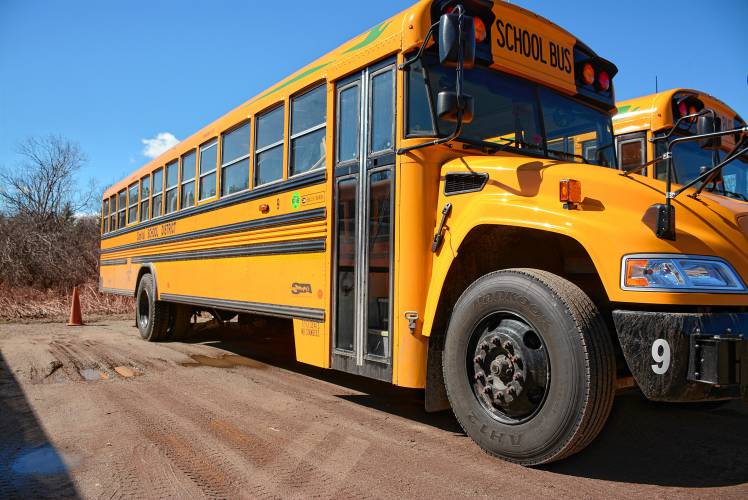State and “coalition communities” argue that school funding should remain unchanged

A ConVal School District bus. (Benji Rosen/ Monadnock Ledger-Transcript) Benji Rosen
|
Published: 08-16-2024 8:52 AM
Modified: 08-23-2024 4:58 PM |
To Zack Sheehan, any taxpayer in New Hampshire should be enraged if they pay a school tax rate of more than $8 – which is most of the state.
These high rates could be alleviated if a town that raises more than what’s required by state law for the Statewide Education Property Tax, returns the rest to the state so it could be redistributed to poorer communities to offset their local education costs.
In a town like Pembroke, the school tax rate was $12.62. In Waterville Valley, it was $2.47 last year.
“This isn’t going to solve everything but it is a critical element in expanding the options for creating a more equitable school funding system," said Sheehan, the executive director of the nonprofit New Hampshire School Funding Fariness Project.
Yet the state and a group of 26 towns are defending current school funding practices. In a brief filed to the New Hampshire Supreme Court, the group argued in favor of a uniform application of the state’s property tax scheme.
The brief, filed by Attorney General John Formella and Solicitor General Anthony Galdieri, maintained that the state’s education property tax is reasonable as is and should be proportionally applied across municipalities.
In 2022, a handful of property taxpayers – as local as Penacook – filed a lawsuit, known as Rand versus the State of New Hampshire, named after plaintiff Steven Rand of Plymouth.
Last year, plaintiffs in the case asked Judge David Ruoff in Rockingham Superior Court to hear a portion of the case independently – which focused on the Statewide Education Property Tax.
Article continues after...
Yesterday's Most Read Articles
 With Steeplegate still held up in court, city privately debates public investment
With Steeplegate still held up in court, city privately debates public investment
 State budget mandates sale of mental health housing in Concord
State budget mandates sale of mental health housing in Concord
 ‘Peace of mind’: As New Hampshire nixes car inspections, some Concord residents still plan to get them
‘Peace of mind’: As New Hampshire nixes car inspections, some Concord residents still plan to get them
 Former Castro’s building to hold apartments and the cigar shop will return, eventually
Former Castro’s building to hold apartments and the cigar shop will return, eventually
 Sudden pile of trash near Exit 13 on Manchester Street in Concord considered ‘illegal dumping’
Sudden pile of trash near Exit 13 on Manchester Street in Concord considered ‘illegal dumping’
 Mullet madness: Young man who died in motorcycle accident remembered at local fundraiser
Mullet madness: Young man who died in motorcycle accident remembered at local fundraiser
On tax bills in New Hampshire, a Statewide Education Property Tax helps fund an “adequate education” in each municipality. By law, the state is required to collect $363 million and a rate is set per community to collect this amount.
Several communities in New Hampshire with high property values raise more than what’s required to fulfill the state’s obligations. Currently, the municipality can retain that money to offset other taxes.
More than two dozen communities – including Gilford, Meredith and Newbury – make up the 26 “Coalition Communities” that are siding with the state in their argument that state funding practices should remain as they are.
These communities are property-wealthy, with an average property value of $941,800. The average equalized state education tax rate in these towns is $4.20, which is half the state average of $8.81.
To Sheehan, the argument from these communities that they should have a say over the use of their state tax differs from other revenue streams.
He gives the example of a business profits tax – a manufacturing company in Manchester would have no say if their tax revenue was spent in Milton.
“School funding is the only structure in which we have this concept around and it is because of the coalition communities,” he said.
As a result, there is a mindset that “it’s a town’s money, even though it’s individual property taxpayers that are paying these taxes,” he said.
The Rand case is one of landmark lawsuits that’s challenging the state’s funding structures. The other, from the Contoocook Valley School District, argues that the state is inadequately funding education.
In that case, Ruoff also ruled in favor of the plaintiffs and said the state needed to increase education spending per pupil from $4,100 a year to at least $7,356.
The Supreme Court granted a stay over this decision in March, which paused the state’s need to increase funding.
Oral arguments will begin in the Supreme Court this fall about this portion of the Rand case, while the rest of the lawsuit will be heard in Superior Court starting September 30.







 Summer camp offers support and adventure for children being raised by grandparents: ‘These kids got to be kids’
Summer camp offers support and adventure for children being raised by grandparents: ‘These kids got to be kids’ ‘Best day of the year’: Canterbury celebrates 67th annual country fair
‘Best day of the year’: Canterbury celebrates 67th annual country fair ‘Entire paradigm has to shift’: Majority of parents express support for phone ban, but predict rocky rollout
‘Entire paradigm has to shift’: Majority of parents express support for phone ban, but predict rocky rollout
